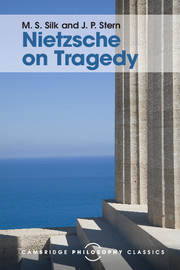Book contents
- Frontmatter
- Dedication
- Epigraph
- Contents
- Preface to this edition
- Preface
- Note
- 1 Germany and Greece
- 2 Biographical background I: Nietzsche and his early interests
- 3 Biographical background II: the genesis of The Birth of Tragedy
- 4 The argument of The Birth of Tragedy
- 5 The aftermath
- 6 Nietzsche's account of Greece
- 7 Mode and originality
- 8 Tragedy, music and aesthetics
- 9 Nietzsche and earlier German theories of tragedy
- 10 Style and philosophy
- Bibliography
- Index
3 - Biographical background II: the genesis of The Birth of Tragedy
Published online by Cambridge University Press: 05 August 2016
- Frontmatter
- Dedication
- Epigraph
- Contents
- Preface to this edition
- Preface
- Note
- 1 Germany and Greece
- 2 Biographical background I: Nietzsche and his early interests
- 3 Biographical background II: the genesis of The Birth of Tragedy
- 4 The argument of The Birth of Tragedy
- 5 The aftermath
- 6 Nietzsche's account of Greece
- 7 Mode and originality
- 8 Tragedy, music and aesthetics
- 9 Nietzsche and earlier German theories of tragedy
- 10 Style and philosophy
- Bibliography
- Index
Summary
Basle, Tribschen, and the first plans for a book
Up to this point in our narrative, it has been possible, with some difficulty, to keep the three main strands of Nietzsche's life apart. With the beginning of his Basle period, it is virtually impossible to separate these or any aspects of his life or work, including the complicated genesis of BT. Everything converges – and Nietzsche himself does everything possible to ensure that it should. The convergence, in fact, reflects his first full-scale, and characteristically self-conscious, attempt to oppose fragmentation in favour of a whole response to experience. As he puts it, with a certain dispassionate irony, in a letter of early 1870: ‘I observe how my philosophical, moral and scholarly endeavours strive towards a single goal and that I may perhaps become the first philologist ever to achieve wholeness.’ And how should he achieve it? Throughout this early period, ‘Schopenhauer’ is the device behind which Nietzsche is mustering his increasingly independent thinking. And so he can still express his aspiration towards that ‘wholeness’ in terms of a unifying Schopenhauerianism. In September 1869 he writes: ‘I really do stand now at a centre from which Schopenhauerian threads reach out into all parts of the world’; and it was in April, on the eve of his departure for Basle, that he had expressed the ambition to infuse his own philological discipline with ‘that Schopenhauerian seriousness…; I should like to be something more than a drill-master for competent philologists – the generation of present-day teachers, the care of the growing younger generation, this is what I have in mind.’
Despite these protestations, however, it can hardly be denied that Nietzsche's main enthusiasm, and the main stimulus to his enthusiasms in general, was no longer Schopenhauer, but the composer whose devotee he was and whose intimate friend he shortly became. ‘Intimate’ is not, perhaps, the right word. There is a case for saying that Nietzsche's relationships, though often intense, hardly ever permitted the degree of self-revelation, at least on his side, that true intimacy presupposes. His friendship with Rohde might be an exception here; his relationship with Wagner was probably not. Nevertheless, there is no doubt that this relationship flourished.
- Type
- Chapter
- Information
- Nietzsche on Tragedy , pp. 36 - 78Publisher: Cambridge University PressPrint publication year: 2016

